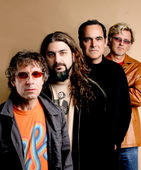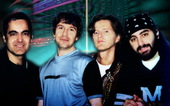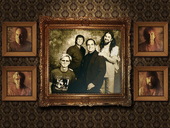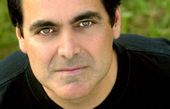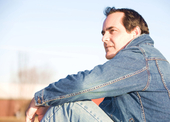Transatlantic
Four Different Personalities
12.03.2011
Архив интервью | Русская версияThere are few persons on the progressive rock scene today that contributed more to neo prog revival of the late 90s than Neal Morse. His band Spock’s Beard proved to all the unbelievers that art rock of the 70s was still relevant at the dawn of the new millennium, and when he teamed up with Roine Stolt (The Flower Kings), Mike Portnoy (Dream Theater) and Peter Trewavas (Marillion) to form prog rock supergroup Transatlantic, it was the ultimate triumph of the genre that so many believed to have gone forever. But for me personally Neal Morse is also remarkable, for he was the person I did my very first phoner with. It was as far back as September 2001, but your first time is something that you never forget.
A lot of things have changed since that conversation. Having become a born again Christian, Neal quit Spock’s Beard (which went on with a different singer) and Transatlantic (which stopped functioning) and ventured into solo career, releasing album after album, all devoted to various aspects of man-God relationship. All of a sudden, the news arrived that Transatlantic are back together in their original form, and a new studio album called “The Whirlwind” (2009) was a brilliant proof of the band’s vitality and fine shape. Keeping up with their traditions, the band recorded their subsequent live tour and put out a larger-than-live package of triple CD/double DVD “Whirld Tour” (2010), which once again brought us at the two ends of the telephone line connecting Tennessee and Moscow. The circle was nearing completion.
Well, things were not that easy this time. Though we were at the two ends of the line, the connection was not there. The labels appointed another date, but this time Neal was only able to reach me via my cell phone (which would mean a financial disaster for the label and impossibility to tape the conversation for me). At this point I was already feeling like “no matter what”, so I dialed Neal’s number myself (luckily it was saved by the cell phone) and we f**king did it against all odds. But that’s not the end of this Trail of Tears – I went back to the tape a few months later only to find out that the sound quality was so miserable that some of Neal’s phrases were impossible to understand. The text below is all that I managed to rescue, but despite all my effort it still falls short of what I would call a good interview. Well, sometimes the stars (god, devil or whatever) are just too strong for humans to battle…
You have just released a new live album and DVD with Translatlantic. You have recorded quite a few live releases in the past, both with Transatlantic and solo. Was there anything special in the recording process of “Whirld Live”, or did you do in basically the same way as you recorded “Testimony Live”, or “Live In Europe”?
We are basically players, so we played the songs, and they filmed and recorded them. In that sense “Whirld Live” is not different from the others. What was different with Transatlantic is that it we played “The Whirldwind”, the whole album, and it was a quite extraordinary experience. And the DVD was shot in London, which was quite different, because we’d never done recording in England, and it was pretty exciting.
For most of contemporary rock bands, a two-hour show or even a 90-minute-long show is normal, while with Transatlantic you play for more than three hours every night. How do you manage to do it? Where do you get all the energy from?
(laughs) Well, being a Christian, I felt like God helped me to do it. When I looked at the schedule I thought, “Oh man, I won’t be able to do that! Three hours a night, seven gigs in a row – I don’t think I will be able to do that!” But I was able to do it, and it was great. I didn’t feel tired, I felt it was just flowing – seven gigs in a row, and the seventh gig we were doing was still superb. I don’t think it was because we were doing it, I felt like God was helping me out there. I don’t know where I got all the energy from! (laughs) I felt the power of music and all the guys were doing a great job, so it was really a great experience.
How did you get Steve Hackett of Genesis to play “Return Of The Giant Hogweed” with you at the High Voltage festival?
We’re on the same label in Europe, and I think Mike asked him to do it. Mike just contacted him and he said, “Yes, sure!” That was really exciting. Steve is a very humble and kind person.
Once again you had Daniel Gildenlowe joining you live on guitar and keyboards. However, if you look at the music on the past few Pain Of Salvation albums and at his favorite bands he mentions in interviews, this is all very far away from Transatlantic. Why did you choose this particular person to accompany you?
I don’t know. We enjoyed this thing with him on the last tour, and we asked him if he wanted to do it again… I mean, Daniel enjoys a lot of different kinds of music. He’s a very interesting and varied kind of guy, he likes all kinds of things.
Have you heard Pain Of Salvation’s “Scarsick” album, and if yes, what do you think of it?
No, I haven’t heard it. I heard there was a controversy caused by the song “America”, but I haven’t actually heard the song.
Transatlantic took a big break before “The Whirlwind”, you did not play together for seven years, if I’m not mistaken. How did your fellow bandmembers change over this period of time? Was it easy or difficult to regain the chemistry between the four of you?
It seemed like we never left, it’s amazing. It’s very extraordinary how smooth that happened, I was amazed by that. We’re just trying to live on, I think we’ve grown a little bit. It was an exciting thing to get together again, and we all really enjoyed it.
Do I get it right that the idea to reform Transatlantic came from you?
Yeah, it did come from me. I prayed about it and felt like it was the right time to do it.
Does it mean that for “Whirlwind” you contributed more than the rest of the band?
No, I don’t think so. We did about 20 minutes of my music, maybe a little bit more, but not much. There’s a lot of Peter’s, Roine’s and Mike’s ideas, and we put them all together when we got together. That’s a cool thing about Transatlantic – we are four different personalities, and it’s a very wild thing with an unpredictable outcome.
When you quit Spock’s Beard and Transatlantic and began a full-time solo career, how much did your audience change? Was it easy for progressive rock fans to accept the change in your lyrical direction, so to say?
It seems like it. I lost some people, I gained some people, and some people who were not into it originally got into it over the time. I’m really happy with how the things are going today, and I’m really grateful to my audience.
In Russia, there are many people who like progressive rock music, but the problem is that everyone has his/her own favorite bands and doesn’t like others’ favorite bands. Therefore it is very difficult to arrange concerts, because the fans love different bands, and nobody shows up if it’s not their favorite. I would say there is a total lack of unity on this scene in Russia. How is it like in the United States? For instance, in your home town, would you say there is a progressive rock community there?
No, not really. I live here in Nashville, Tennessee, and not many progressive rock fans live here. Anyway, in music it’s always like that way no matter what genre we’re talking about - some people like blues and some people don’t like it, they love other things. I’m just grateful to be able to do it and not have problems. It’s great that I’m able to do what I love and that there are people who enjoy it as well.
As far as I remember, you are the owner of Radiant Records, the label which releases your albums in the States. Nowadays everybody’s complaining that record sales are going down, because people are just downloading stuff for free. How much has this trend affected Radiant Records and you personally?
Ehm, I don’t think it has affected me that much. Thank God, most of the people who are into progressive rock like to buy special editions, they like to have the actual item in their hands. Downloading hasn’t hurt us that much. And iTunes is great, I’m a big proponent of iTunes, because iTunes pays artists every month, and they’re offering integrity. I think it’s a really good company. I’ve always encouraged people to use it if they’re going to download stuff.
If we look at your solo career, “Testimony” (2003) was a very personal album lyrically-wise, and from that point on you were drifting towards not so personal themes, like on “Sola Scriptura” (2007). Do you think you went too far with “Testimony” in exposing yourself to the public?
I don’t think so, it’s still a lot of people’s favorite album. People like to hear something real, something that they know it’s from the heart, something that matters to someone else. No, I’ve never felt that way about that.
By the way, what was that Eagles song that you mention in the lyrics of “California Nights”? “If I played that terrible Eagles song one more time I though I was gonna die”…
(laughs) That would have been “Hotel California”. It’s really not terrible, and right before the record was released I wanted to change it to “tired”, because it’s really not a terrible song, I was just tired of playing it. I wanted to change that lyric, but it was too late, the album already got mastered.
In the discography section of your website, I found a very interesting item – a CD called “Neal Morse’s Bavarian Polka Odyssey”. Can you say a few words about it?
(laughs) That’s a joke! I actually didn’t put in on there, the guy who’s my web designer played that trick on me. And I didn’t even notice it. He asked me to look over everything and he wanted to hear what I thought. I told him everything was fine and then he e-mailed me the link to the page where the item was displayed. (everybody laughs)
So in reality there’s no such CD, is there?
No, there isn’t any.
But you do sing a couple of songs in German on the latest installment of your “Worship Sessions” (“Mighty To Save”, 2010). How did this come about? Do you speak German?
A little. I’m getting a lot of invitations from Germany, so I’ve been going over to have worship services in churches there in the last five years. I sometimes go to German worship services and I hear people play German worship songs, so eventually I put two of them on “Worship Sessions”.
Can you say a few words about the tracks from the second CD of “Whirlwind”’s limited edition? What is the origin of all this material?
There are some things that we liked but we couldn’t fit into the actual “Whirlwind”. These are things that Pete had, Roine had, and I had. I was wanting to make “Whirlwind” an actual double album, but the band didn’t wanna do it, so we put the extra stuff on the bonus disc.
I guess everybody asks you about your influences and the classic rock and progressive rock bands that you like. But are there any younger bands that you enjoy listening?
Yeah, there’s an Internet radio station that’s really cool, it’s called morow.com. I’ve been listening to it, and every time I hear something that makes me want to have the complete thing I write it down. Lately there’s been an Irish band called Philman (we failed to figure out the correct name, sorry – ed.) and the other one was called something like Oblivion (apparently the reference is made to “Oblivion’s Candle” EP by the Canadian band The Isosceles Project – ed.) It’s really cool, we’re listening to it, me and my engineer, we really dig it. There’s been a lot of really good things lately, morow.com is a really great Internet radio station, check it out!
Now that you are back with Transatlantic, have you considered rejoining Spock’s Beard as well?
No, I haven’t, it hasn’t really come up, it hasn’t been something that’s been discussed.
Now that Roine Stolt and Mike Portnoy are free from their commitments to their main bands, what future do you envision for Transatlantic? Will it remain a project that you take up when you have some time off, or do you plan to work with it on a permanent basis?
We didn’t make any plans at the end of the tour. We kind of left it like we have always done, and we’ll come back to it if it feels right. Right now we don’t have any specific plans.
Transatlantic on the Internet: http://www.transatlanticweb.com
Special thanks to Maxim Bylkin (Soyuz Music) for arranging this interview
Roman Patrashov
November 4, 2010
© HeadBanger.ru
